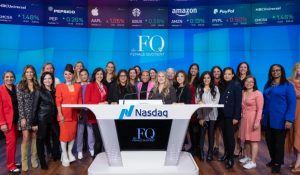Brenda Darden Wilkerson, president and CEO of AnitaB.org, told Yahoo Finance that women leaders in tech are often nicknamed unicorns, which is a disservice to women entrepreneurs and founders because it’s an excuse not to hire or invest in women.
“The unicorn narrative is ‘we can’t find them,’ ‘don’t really understand the specific demographic,’ or ‘too risky to invest,’ so when you make the first $10 million and then come back,” Wilkerson said.
Wilkerson noted that in 1985, women made up 35 percent of the tech industry, compared to 12 percent today, but even as women’s representation in tech peaked, they still had a hard time finding that narrative. Women are not only overlooked in leadership roles, but also when it comes to funding companies to go public. Women-led startups receive only 2.3% of venture capital funding.
Sehr Thadhani, chief digital officer at Nasdaq, told Finance: “If you Google how many female founders take their companies public, you’ll find the number is between 22 and 45 – that’s a staggering number.” More pathways to public markets – figuring this out will have a ripple effect on the entire business ecosystem, because when women lead, they are surrounded by other influential, innovative women who work together to increase access to wealth, etc.”
Hitha Palepu, author and CEO of Rhoshan Pharmaceuticals, spoke of the need to redefine what it means to have potential and success so that these definitions are more inclusive of those who are often overlooked.
“I think we need to look at how we are assessing and counting high potential or valuable candidates. Because in the past and today, it’s all based on our perception of success as being strong, fierce, decisive, tactical. When a woman has any of those qualities, she’s called bossy, assertive, sharp, angry,” said Palep. “So we need to take some time to really figure out some of the new terms that we use to define success, the terms that we use to define potential, and actively start getting into places where we’re not yet hiring.”
Equality and fairness are not the same thing

The theme of the Nasdaq event was Equity Goals: Women in Wealth.
Equality and equity are sometimes used interchangeably, but they are not the same. We asked our leaders to explain what equity means and should look like in the workplace.
“Equity is about making sure that everyone who may be in a different situation has what they need to be successful,” Wilkerson said. “If I grow lettuce and tomatoes in my garden and give them the same amount of water, they probably won’t bloom equally. I say to lettuce, do you need too much water because I’m pouring the same? It may need different soil or sunlight.”
Palepu says fairness doesn’t take away, but provides everyone with the necessary tools to succeed.
“It’s not a pie, it’s a buffet, and the food will keep coming. What’s more important is whether everyone has what they need and what they want to eat when they need it,” Palepu said. “Equality is a benchmark, and you can manipulate the numbers to make it look like you’re equal, but equity requires an investment of time, resources and money to really say, ‘We’re not satisfied with the status quo, we’re investing in a better future.'”

































